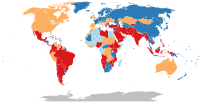
Photo from wikipedia
Background: Evaluating the impact of a nutrition education program could provide insight into the effectiveness of an intervention. Researchers tested the hypothesis that a theory-based contextual nutrition education program (NEP)… Click to show full abstract
Background: Evaluating the impact of a nutrition education program could provide insight into the effectiveness of an intervention. Researchers tested the hypothesis that a theory-based contextual nutrition education program (NEP) would improve the nutrition knowledge, attitudes, and dietary practices (KAP) of teachers and learners. Methods: Twenty three teachers who taught nutrition in Grades 4–7 (treatment school, n = 12) and 681 learners (treatment school, n = 350) participated in the study. In this quasi-experimental study, two primary schools were randomly selected to implement a contextual NEP. The nutrition KAP were assessed using previously validated questionnaires. The treatment school teachers taught nutrition using a developed nutrition education manual, while the control school teachers taught nutrition in the usual manner. Random effects Generalized Least Squares regression estimated the difference in the teachers' and learners' KAP for the treatment and control schools; p = 0.025 for a one-tailed test. Results: At post-implementation, the treatment school teachers' had higher total nutrition knowledge mean score (85.5% ± 8.2, p = 0.003) compared to the control school. Within the treatment school, total nutrition knowledge mean score of the teachers improved by 14.1%, p ≤ 0.001. Learners in the treatment school had higher total nutrition knowledge (53.2% ± 16.9, p = 0.002) and nutrition attitude (63.9% ± 19.7, p = 0.001) scores compared to learners in the control school. Within the treatment school, learners' total nutrition knowledge and nutrition attitudes scores increased by 4.9%, p ≤ 0.001 and 6.9%, p ≤ 0.001, respectively. The dietary practices of the teachers and the learners, and the nutrition attitudes of the teachers in the treatment school showed no significant within school improvement or in comparison with the control school (p > 0.025). Conclusions: The NEP led to the improvement in the teachers' and the learners' nutrition knowledge and the learners' nutrition attitudes. However, no significant improvement in the dietary practices of either teachers or learners was found.
Journal Title: Frontiers in Public Health
Year Published: 2019
Link to full text (if available)
Share on Social Media: Sign Up to like & get
recommendations!